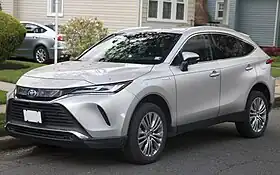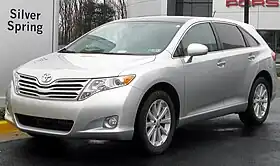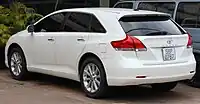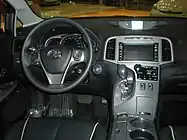Toyota Venza
The Toyota Venza is a five-passenger mid-size crossover SUV manufactured and marketed by Toyota primarily for the North American market, beginning with its introduction in 2008 and now in its second generation — with a hiatus for model years 2018–2019.
| Toyota Venza | |
|---|---|
 2021 Toyota Venza Hybrid Limited (US) | |
| Overview | |
| Manufacturer | Toyota |
| Body and chassis | |
| Class | Mid-size crossover SUV |
| Body style | 5-door SUV |
| Layout | |
The first-generation Venza was based on the XV40 series Camry platform and marketed between 2008 and 2017 — and shared the platform with the AL10 series Lexus RX. The second-generation model is a rebadged Japanese-market XU80 series Harrier and has been sold since September 2020.
First generation (AV10; 2008)
| First generation (AV10) | |
|---|---|
 | |
| Overview | |
| Production | November 2008 – 2017[2][3] |
| Model years | 2009–2015 (US) |
| Assembly | United States: Georgetown, Kentucky (TMMK) |
| Designer | Tatsuya Sonoda, Chung Lee, Scott Roller and Ian Cartabiano[4] |
| Body and chassis | |
| Platform | Toyota K platform |
| Related | |
| Powertrain | |
| Engine | |
| Power output |
|
| Transmission | 6-speed automatic |
| Dimensions | |
| Wheelbase | 109.3 in (2,775 mm) |
| Length | 189.0 in (4,800 mm) |
| Width | 75.0 in (1,905 mm) |
| Height | 63.4 in (1,610 mm) |
| Curb weight | 4,045 lb (1,835 kg) |
The first-generation Venza was unveiled at the 2008 North American International Auto Show in Detroit. It was designed at the Calty Design studios in Newport Beach, California, based on the FT-SX concept car and primarily engineered at Toyota Technical Center in Ann Arbor, Michigan. Venza's production began at Toyota Motor Manufacturing Kentucky (TMMK) in Georgetown, Kentucky[5] in November 2008.[6] The 2.7 L model was launched in February 2009.
The first-generation Venza is based on the XV40 series Camry chassis[7] (K platform) and is similar to the Mark X ZiO in concept. It was powered by either a 2.7 L 1AR-FE four-cylinder engine or a 3.5 L 2GR-FE V6 engine, both mated to a 6-speed automatic transmission.[8] The Venza was available in Front-wheel drive or all-wheel drive. The US Environmental Protection Agency estimated fuel economy of 21 mpg‑US (8.9 km/L; 25 mpg‑imp) in the city and 29 mpg‑US (12 km/L; 35 mpg‑imp) in the highway with the 2.7 L engine.[9]
Features
The Venza had a single trim level, with numerous packages and options. Standard features include fog lamps, 19-inch alloy wheels (2.7 L), 20-inch alloy wheels (3.5 L), HomeLink, XM satellite radio, 6-disc CD changer, dual-zone climate control, electrochromic auto-dimming rear-view mirror, 8-way power drivers seat, steering-wheel mounted audio controls, Hill-Start assist control and the Toyota Star Safety System.[10][11]
Options include automatic high beams with HID lighting, heated side view mirrors, power liftgate, leather seat surfaces, 4-way power passenger seat, panoramic glass moonroof, smart key system, 13-speaker JBL sound system with Bluetooth, voice-activated touch-screen DVD navigation system, backup camera and a rear DVD entertainment system with a 9-inch display and two wireless headphones. The Touring Package, which included HID headlights, push button start, Navigation, and the JBL Sound Package, was only available for the 3.5-liter all-wheel drive configuration. The Premium Package, which contained the moonroof and backup camera, was available for all but the 2.7-liter front-wheel drive configuration. The leather package was available for all models.
For 2010, the Venza received a standard USB audio input and Bluetooth hands-free phone capability. Due to this addition, a single-CD player unit replaced the previously standard in-dash 6-disc CD changer.
For 2012, the Venza featured LE, XLE and Limited trim levels for the US market, replacing the single-grade line with various option packages. The LE and XLE trims were available with all powertrain combinations: 2.7-liter, 3.5-liter, front-wheel drive or all-wheel drive; the Venza Limited comes with the 3.5-liter engine only, in front-wheel drive or all-wheel drive configurations.[12] Canadian models retained the single trim level, adding only a Convenience Package for the 2.7-liter all-wheel drive trim.
 Rear view
Rear view Interior
Interior
2012 facelift
_China_(3)_(cropped).jpg.webp)
In 2012, for the 2013 model year, the Venza received a mid-cycle facelift. It was revealed at the New York International Auto Show in April 2012 and went on sale during May 2012. 2.7 L models receive restyled 19-inch alloy wheels. The 2013 model also added an integrated multimedia navigation and telematics system, marketed as Toyota Entune.
Engines
| Gasoline | |||||
|---|---|---|---|---|---|
| Chassis code | Model | Engine | Transmission | Power | Torque |
| AGV10 (FWD) AGV15 (4WD) |
2.7 L I4 | 2,672 cc 1AR-FE DOHC 16-valve EFI straight-four with Dual VVT-i | 6-speed automatic | 181–182 hp (135–136 kW; 184–185 PS) at 5,800 rpm | 182 lb⋅ft (247 N⋅m) at 4,200 rpm |
| GGV10 (FWD) GGV15 (4WD) |
3.5 L V6 | 3,456 cc 2GR-FE DOHC 24-valve EFI V6 with Dual VVT-i | 268 hp (200 kW; 272 PS) at 6,200 rpm | 246–248 lb⋅ft (334–336 N⋅m) at 4,700 rpm | |
Safety
The Venza was equipped with vehicle stability control, traction control system, electronic brakeforce distribution, emergency brake assist, anti-lock braking system, smart stop technology as well as hill-start assist control, tire-pressure monitoring system, active head restraints for front-seat occupants, 3-point seat belts and headrests for all seats, emergency locking retractors (ELR) for all seats, automatic locking retractors (ATR) for all seats (except driver's), front seatbelt pretensioners with force limiters. LATCH (Lower Anchors and Tethers for Children) for rear outboard seats and seven standard airbags, including dual-stage front airbags, driver's knee airbag, front seat-mounted side airbags, 2-row side curtain airbags and fuel pump cut-off switch with airbag deployment. The rear bumper system was awarded Toyota's top honor for innovation, and safety.[13]
Some Venza owners have reported a safety concern because the sun visor can suddenly sag and obscure the driver's vision while driving.[14][15] The visor must be replaced once this occurs. An online petition was created to encourage Toyota to issue a safety recall due to the failing sun visors.
Crash testing
| Frontal Driver: | |
| Frontal Passenger: | |
| Side Driver: | |
| Side Rear Passenger: | |
| Rollover: |
The Insurance Institute for Highway Safety gave the Venza its Top Safety Pick rating in 2009.[17][18] The Venza is also rated "Good" in the roof strength test, as a result the Venza also received the Insurance Institute for Highway Safety Top Safety Pick in 2010 and 2011 when roof strength became a criterion for receiving the award.[19][20]
Production
The first-generation Venza began production at Toyota Motor Manufacturing Kentucky (TMMK) on November 11, 2008, with over 70 percent of the Venza's components coming from US suppliers.[21] Toyota projected sales of between 75,000 and 100,000 units of Venza per year.[22] The first-generation Venza was one of the two North American built Toyota automobiles (alongside the Avalon) not to be sold in Mexico.
TMMK stopped production of the Venza in the American market in June 2015.[23] Production of the vehicle remained there for export until 2017.[3]
Marketing
During the 2008 vehicle launch, Toyota marketed Venza under the campaign "You're More than One Thing. So is Venza".
In Canada, the Venza was featured as a prize in the 2009 Tim Hortons "Rrroll up the rim to win" promotion.
In 2013, the Venza debuted in Russian and Chinese markets.[24]
Classification
Determining whether the Venza is a crossover SUV or wagon isn't clear; some journalists regard it as the "Camry station wagon"[25] (the successor to the 1991-1996 Camry wagon which was the last iteration to offer this style in Canada and the US) while other sources often describe it simply as new type of "crossover".[26] Toyota states the Venza blends the "styling and comfort of a passenger car with the flexibility of a sport utility vehicle".[27] According to Toyota, Venza is neither a station wagon nor SUV, rather it is targeted at customers who want more room and flexibility than the Camry sedan but desire a smaller size than the Highlander, a three-row mid-size crossover SUV. Toyota lists the Venza's competitors as the Honda Accord and Nissan Altima on their website's comparison page, both being popular mid-size sedans.[28] Meanwhile, the United States Environmental Protection Agency (EPA) classified the Venza as a sport utility vehicle.[29]
Toyota told automotive magazine Motor Trend that it forwent entering the Venza in the publication's SUV of the Year competition.[30] Toyota requested that the Venza compete in the Car of the Year competition. Motor Trend decided that the Venza should not compete in any competition at all since its ride height is too high to be qualified as a car.
Discontinuation
In 2015, Toyota announced that the first-generation Venza would be discontinued after the 2015 model year. According to Toyota, there are three factors that contributed to this decision: customer preference, competitiveness within the segment and deteriorating sales. Production of US models ended in June 2015 and export models ended production in 2017.[3]
Second generation (XU80; 2020)
| Second generation (XU80) | |
|---|---|
 2021 Venza XLE (AXUH85, US) | |
| Overview | |
| Also called | Toyota Harrier |
| Production | June 2020 – present |
| Model years | 2021–present |
| Assembly |
|
| Designer | Nobuhiko Honda, Pansoo Kwon, Hideo Koyama and Daisuke Iguchi[31] |
| Body and chassis | |
| Platform | TNGA: GA-K[32][33] |
| Related | |
| Powertrain | |
| Engine | |
| Electric motor |
|
| Power output |
|
| Transmission | |
| Hybrid drivetrain | Power-split |
| Battery | 1.6 kWh nickel–metal hydride (hybrid) |
| Dimensions | |
| Wheelbase | 105.9 in (2,690 mm) |
| Length | 186.6 in (4,740 mm) |
| Width | 73.0 in (1,855 mm) |
| Height | 65.9 in (1,675 mm) |
| Curb weight | 3,847 lb (1,745 kg) |
The second-generation Venza is a rebadged Japanese-market XU80 series Harrier, released for the North American market for the 2021 model year. It was initially planned to be revealed at the April 2020 New York International Auto Show but it was instead unveiled online in North America on May 18, 2020. Unlike the Harrier, the Venza for this market is only available with a all-wheel drive hybrid powertrain. While the first-generation model was produced in the US, the North American second-generation model is produced in Japan.[34][35][36][37]
The second-generation Venza is also sold in China by GAC Toyota and produced at the Guangzhou factory, with alterations on the front fascia.[38]
U.S. early changes
- 2021, for the 2022 model year: The Limited grade was updated, with fog lights for poor weather conditions.
- 2022, for the 2023 model year: The Nightshade package is added for the XLE model, the exterior colour Wind Chill Pearl (replaced the Blizzard Pearl), the Limited grade gets a 12.3" full digital instrument cluster, and features four drive modes.[39]
 Rear view
Rear view.jpg.webp) Chinese-market Venza
Chinese-market Venza.jpg.webp) Chinese-market Venza rear
Chinese-market Venza rear
Sales
| Calendar year | U.S. | Canada[40] |
|---|---|---|
| 2008 | 1,474[41] | |
| 2009 | 54,410[42] | 12,375[43] |
| 2010 | 47,321 | 12,468[44] |
| 2011 | 38,904 | 13,159[45] |
| 2012 | 43,095[46] | 11,294[45] |
| 2013 | 35,846[47] | 9,167[48] |
| 2014 | 29,991[49] | 7,630 |
| 2015 | 21,351[50] | 6,129 |
| 2016 | 589[51] | 5,971 |
| 2017 | 14[52] | 1,680 |
| 2018 | 9[52] | |
| 2019 | 9[53] | |
| 2020 | 13,073[53] | 1,403 |
| 2021 | 61,988[54] | 6,249 |
| 2022 | 33,683[55] |
References
- "Toyota Traditions". Toyota Global Site. Archived from the original on January 20, 2018. Retrieved December 30, 2020.
- "A look at Toyota's 25 years in Kentucky". KyForward. Lexington, Kentucky. Archived from the original on November 12, 2014.
- Wood, Colum (March 3, 2015). "Toyota Venza Axed". AutoGuide.com. Archived from the original on May 10, 2016. Retrieved October 10, 2016.
Assembly of the Venza at Toyota's Georgetown, KY plan will cease in June, or at least assembly of models for the US market will, with export models being built until 2017.
- US D679633, Sonoda, Tatsuya; Lee, Chung & Roller, Scott et al., "Motor vehicle and/or toy replica thereof", published 2013-04-09, assigned to Toyota Motor Corp.
- "Venza Crossover Sedan to Make World Debut at 2008 NAIAS" (Press release). US: Toyota. December 19, 2007. Archived from the original on January 5, 2016. Retrieved November 9, 2015.
- "Toyota Begins Venza Production in Kentucky" (Press release). US: Toyota. November 10, 2008. Archived from the original on January 5, 2016. Retrieved November 9, 2015.
- Robinson, Aaron (June 2009). "2009 Toyota Venza - Road Test". Car and Driver. Archived from the original on September 18, 2020. Retrieved August 7, 2014.
- 2008 Detroit Auto Show: 2009 Toyota Venza Archived 2008-01-18 at the Wayback Machine - Edmunds
- "Retrieved 4-Jan-09". Fueleconomy.gov. Archived from the original on June 11, 2009. Retrieved January 17, 2012.
- "Toyota Venza Begins Production". Automoblog.net. Archived from the original on December 22, 2010. Retrieved January 5, 2009.
- Jonathon Ramsey. "First Drive: 2009 Toyota Venza". Autoblog.com. Archived from the original on March 15, 2016. Retrieved January 17, 2012.
- "Toyota expands Venza model line to three trims for 2012". Autoblog.com. Archived from the original on January 26, 2012. Retrieved January 23, 2012.
- "Toyota gives top honor to Hydro innovation" (Press release). Hydro. April 15, 2009. Archived from the original on May 9, 2021. Retrieved June 12, 2021.
- "Driver side visor is sagging". ToyotaNation.com. Archived from the original on December 10, 2017. Retrieved December 9, 2017.
- "NHTSA - Visibility Problems 2009 Toyota Venza". CarComplaints.com. Archived from the original on December 10, 2017. Retrieved December 9, 2017.
- "Safercar.gov". Safercar.gov. Retrieved October 17, 2009.
- "IIHS-HLDI: Toyota Venza". Iihs.org. June 15, 2009. Archived from the original on March 27, 2010. Retrieved October 17, 2009.
- "IIHS-HLDI: Toyota Venza". Iihs.org. June 15, 2009. Archived from the original on September 16, 2009. Retrieved October 17, 2009.
- "Roof strength evaluations: Midsize SUVs". Iihs.org. Archived from the original on February 2, 2013. Retrieved January 17, 2012.
- "TOP SAFETY PICK 2011 winners". Iihs.org. Archived from the original on May 20, 2007. Retrieved January 17, 2012.
- Toyota launches production of Venza Archived February 26, 2009, at the Wayback Machine - Business First of Louisville
- Toyota shows new Venza crossover sedan to undergo production this November in Georgetown - Louisville Courier-Journal.
- "Toyota announces plans to end the production of Venza crossover". CarTrade. March 4, 2015. Archived from the original on March 4, 2015. Retrieved March 4, 2015.
- "Toyota Venza Crossover Hits Russia". Wroom.ru. April 2, 2013. Archived from the original on April 20, 2013. Retrieved April 18, 2013.
- "2012 Toyota Venza Expert Review - MSN Autos". Archived from the original on June 23, 2013. Retrieved October 3, 2012.
- "2009 Toyota Venza Review and Specs". Edmunds.com. Archived from the original on August 31, 2009. Retrieved November 26, 2009.
- "New 2009 Venza Optimizes Traditional Passenger Car" (Press release). US: Toyota. November 3, 2008. Archived from the original on January 30, 2016. Retrieved January 24, 2016.
- "2009 Toyota Venza Review". Automoblog.net. October 29, 2009. Archived from the original on October 18, 2010. Retrieved October 29, 2009.
- "Gas Mileage of 2009 Sport Utility Vehicle". www.fueleconomy.gov. Archived from the original on March 23, 2021. Retrieved May 18, 2020.
- Where's the Venza? Archived February 27, 2009, at the Wayback Machine - Motor Trend
- US D938309, Honda, Nobuhiko; Kwon, Pansoo & Koyama, Hideo et al., "Motor vehicle and/or toy replica thereof", published 2021-12-14, assigned to Toyota Motor Corp.
- "Toyota to Unveil New Model Harrier in Japan" (Press release). Toyota City, Aichi: Toyota Global Newsroom. April 13, 2020. Archived from the original on December 24, 2021. Retrieved November 7, 2020.
- Chan, Mick (April 13, 2020). "All-new 2020 Toyota Harrier debuts – TNGA (GA-K) platform, 2.0L petrol, Direct Shift-CVT, no more turbo". Paultan.org. Malaysia: Driven Communications. Archived from the original on July 13, 2022. Retrieved November 7, 2020.
- "Toyota Breaks the Sameness Barrier With All-New 2021 Venza Crossover" (Press release). US: Toyota. May 18, 2020. Archived from the original on May 21, 2020. Retrieved June 12, 2021.
- Goodwin, Antuan (May 18, 2020). "2021 Toyota Venza reborn with standard hybrid power and all-wheel drive". CNET.com. US: CNET. Archived from the original on June 20, 2022. Retrieved May 20, 2020.
- Tan, Danny (May 19, 2020). "2021 Toyota Venza – new fourth-gen Harrier goes to US". Paultan.org. Malaysia: Driven Communications. Archived from the original on May 9, 2022. Retrieved May 20, 2020.
- Capparella, Joey (May 18, 2020). "Toyota Venza Returns for 2021 as Two-Row Hybrid-Only SUV". Car and Driver. US. Archived from the original on June 14, 2022. Retrieved May 20, 2020.
- Lodhi, Abdullah (September 14, 2021). "New Toyota Venza exposed with lots of Lexus ingredients". Car News China. Archived from the original on December 24, 2021. Retrieved October 2, 2021.
- "Toyota Dials Up Style Factor on Venza with Dramatic 2023 Nightshade Edition" (Press release). US: Toyota US. May 12, 2022. Archived from the original on May 17, 2022. Retrieved May 17, 2022.
- "Toyota Venza Sales Figures". GCBC. Archived from the original on January 5, 2022. Retrieved January 12, 2022.
- "Toyota Reports 2008 and December Sales" (Press release). US: Toyota. January 5, 2009. Archived from the original on August 13, 2009.
- "Toyota Reports December And 2009 Sales" (Press release). US: Toyota. January 5, 2010. Archived from the original on February 22, 2012. Retrieved January 17, 2012.
- "TCI Month End Sales Results for December 2010" (PDF) (Press release). Canada: Toyota. January 2011. Archived from the original (PDF) on January 10, 2014. Retrieved January 4, 2011.
- "TCI Month End Sales for December 2011" (PDF) (Press release). Canada: Toyota. January 2011. Archived from the original (PDF) on January 10, 2014. Retrieved January 11, 2011.
- "TCI Month End Sales Results for December 2012" (PDF) (Press release). Canada: Toyota. January 3, 2013. Archived from the original (PDF) on June 27, 2013. Retrieved January 4, 2013.
- "December 2012 and Year-End Sales Chart" (Press release). US: Toyota. January 3, 2013. Archived from the original on January 6, 2013. Retrieved January 4, 2013.
- "December 2013 and Year-End Sales Chart" (Press release). US: Toyota. January 3, 2014. Archived from the original on January 8, 2014. Retrieved January 9, 2014.
- "TCI Month End Sales Results for December 2013" (PDF) (Press release). Canada: Toyota. January 2014. Archived from the original (PDF) on January 10, 2014. Retrieved January 11, 2014.
- "December 2014 and Year-End Sales Chart" (Press release). US: Toyota. January 5, 2015. Archived from the original on January 7, 2015. Retrieved January 6, 2015.
- "December 2015 and Year-End Sales Chart" (Press release). US: Toyota. January 5, 2016. Archived from the original on January 18, 2016. Retrieved January 18, 2016.
- "December 2016 and Year-End Sales Chart" (Press release). US: Toyota. January 5, 2017. Archived from the original on January 6, 2017. Retrieved January 5, 2017.
- "December 2018 Sales Chart" (Press release). US: Toyota. January 3, 2019. Archived from the original on January 6, 2019. Retrieved January 10, 2019.
- "Toyota Motor North America Reports December 2020, Year-End Sales" (Press release). US: Toyota. January 5, 2021. Archived from the original on January 12, 2021. Retrieved January 11, 2021.
- "Toyota Motor North America Reports U.S. December, Year-End 2021 Sales" (Press release). US: Toyota. January 4, 2022. Archived from the original on January 15, 2022. Retrieved January 12, 2022.
- "Toyota Motor North America Reports Year-End 2022 U.S. Sales Results" (Press release). US: Toyota. January 4, 2023. Archived from the original on January 4, 2023. Retrieved January 5, 2023.